-
01-01-2015
Low birth weight in a municipality in the southeast region of Brazil
Revista Brasileira de Enfermagem. 2015;68(6):1169-1175
Abstract
Low birth weight in a municipality in the southeast region of Brazil
Revista Brasileira de Enfermagem. 2015;68(6):1169-1175
DOI 10.1590/0034-7167.2015680624i
Views0See moreABSTRACT
Objective:
to identify the prevalence of low birth weight in the city of São Paulo.
Method:
epidemiological cross-sectional study with data collected by means of the Brazilian Live Birth Information System related to births occurred in the city of São Paulo between 2007 and 2013. Maternal, gestational, childbirth, and neonatal variables were analyzed descriptively and by association.
Results:
9.65% (1,342,655) of live births were underweight (mean of 3234.55 grams in the term group and 2312.17 in the pre-term group) with a mean maternal age of 27.53 years old. The risk factors identified include maternal age, not having a partner, low maternal level of education, other race rather than white, pre-term pregnancy, multiple births, low number of prenatal check-ups, and cesarean delivery.
Conclusion:
knowledge of this evidence favors planning the care provided by defining strategies to reduce it and consequently improve maternal and infant health care.

-
01-01-2015
Gait speed and cognitive score in elderly users of the primary care service
Revista Brasileira de Enfermagem. 2015;68(6):1163-1168
Abstract
Gait speed and cognitive score in elderly users of the primary care service
Revista Brasileira de Enfermagem. 2015;68(6):1163-1168
DOI 10.1590/0034-7167.2015680623i
Views0See moreABSTRACT
Objective:
to investigate the association between gait speed and the cognitive score of elderly patients enrolled in a Basic Health Unit.
Method:
a quantitative cross-sectional study with 203 elderly, a sample calculated based on the estimated population proportion. Data were collected using a sociodemographic and clinical questionnaire, gait speed test (GS) and the Mini Mental State Examination (MMSE).
Results:
the illiterate patients had a mean MMSE=19.33(±3.7) and GS = 0.76m/s (±0.3); those with low/medium education had a MMSE = 25.43(±2.8) and GS = 0.92m/s (±0.2); and the elderly with higher education had a MMSE = 27.33(±2.9) and GS=1.12m/s (±0.3).There was a weak correlation (R2=00354) between gait speed and cognitive score, with statistical significance (Prob>F = 0.0072) and a positive linear trend.
Conclusion:
the better cognitive score the higher the gait speed; the illiterate elderly were those with lower gait speed, thereby indicating a poorer physical performance.
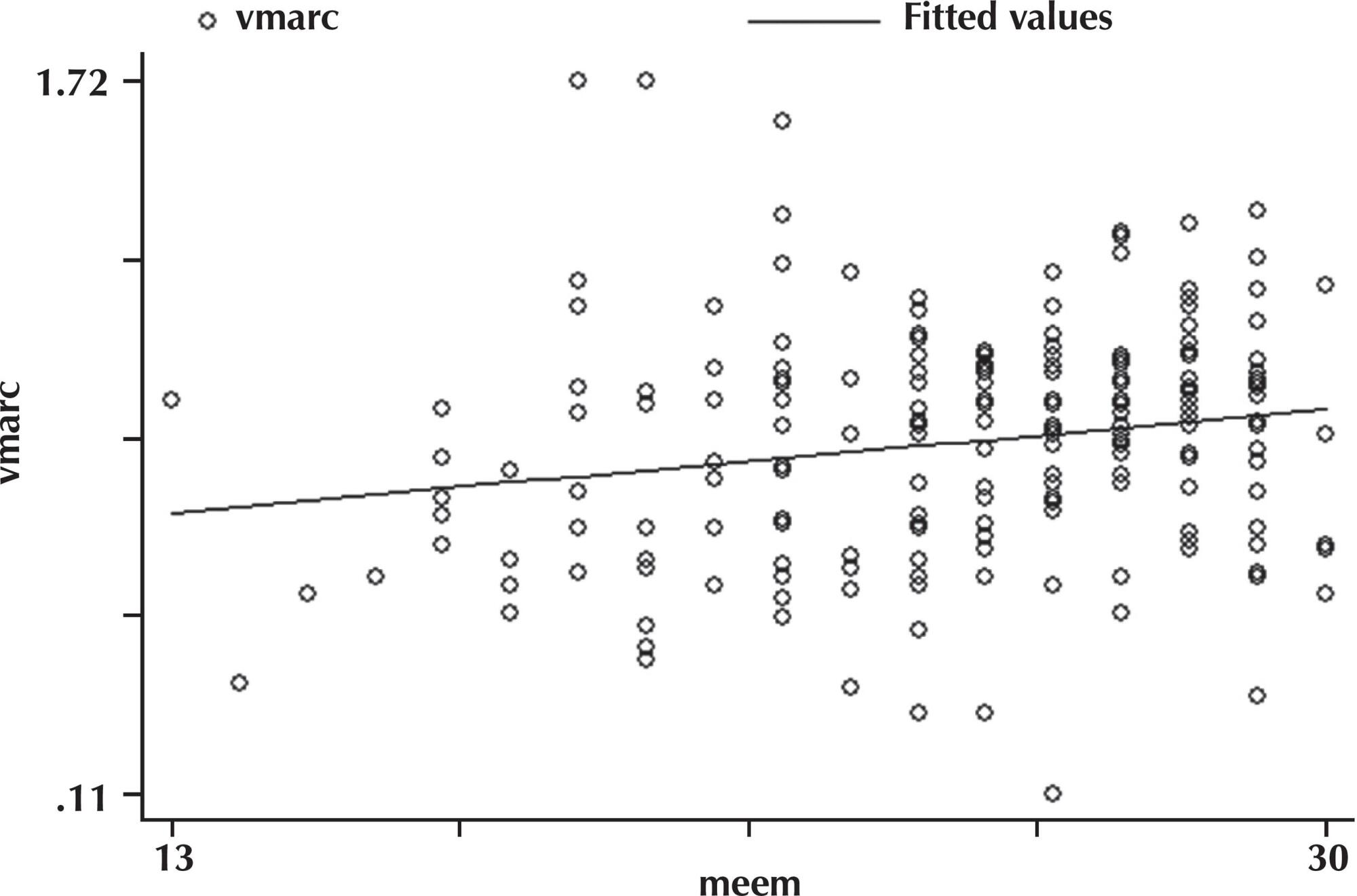
-
01-01-2015
Fluid and dietary restriction’s efficacy on chronic kidney disease patients in hemodialysis
Revista Brasileira de Enfermagem. 2015;68(6):1154-1162
Abstract
Fluid and dietary restriction’s efficacy on chronic kidney disease patients in hemodialysis
Revista Brasileira de Enfermagem. 2015;68(6):1154-1162
DOI 10.1590/0034-7167.2015680622i
Views0See moreABSTRACT
Objective:
to identify self-care measures to manage fluid and dietary restrictions and assess their effectiveness.
Method:
descriptive-correlational study and cluster analysis with 254 chronic renal failure patients on regular hemodialysis program, handled by hemodiafiltration. We evaluated the effectiveness of self-care by interdialytic weight gain (IWG) and by potassium and phosphorus serum pre-dialysis serum levels.
Results:
several self-care measures were significantly correlated with a lower IWG and a lower level of pre-dialysis phosphorus. Patients most often use measures to reduce salt consumption than measures to restrict potassium and dietary phosphorus. The spouse provides important support dietary management. Subjects who use more often the self-care measure are mostly female, are older, less IWG and have a higher Kt/V.
Conclusion:
these results can contribute to the nursing educational support.
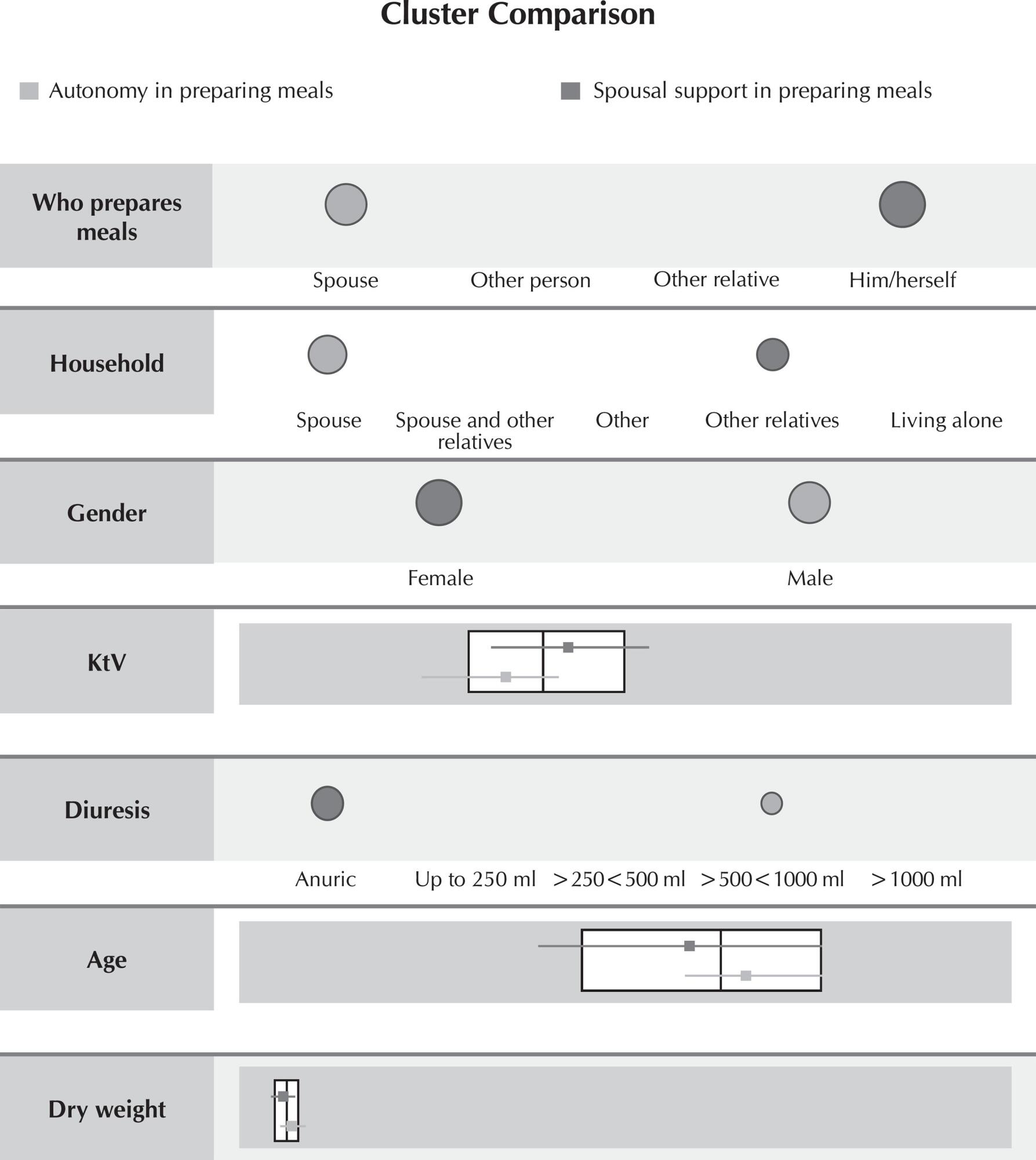
-
01-01-2015
Validation of newborn positioning protocol in Intensive Care Unit
Revista Brasileira de Enfermagem. 2015;68(6):1147-1153
Abstract
Validation of newborn positioning protocol in Intensive Care Unit
Revista Brasileira de Enfermagem. 2015;68(6):1147-1153
DOI 10.1590/0034-7167.2015680621i
Views0See moreRESEARCH
Objective:
to verify the positioning indications of newborn sand build a standard operating procedure protocol for newborn positioning in Neonatal Intensive Care Unit (NICU).
Method:
for protocol validation, the Delphi technique was used ,in which expert nurses in the field reviewed the proposed procedure.
Results:
we present the results of this validation in a protocol form, to contribute to the discussion about newborn positioning in NICU and standardization of nursing care related to positioning. We evaluated ten indicators, in which there was agreementof100.0% in seven, and of80% in three, above the 60% recommended by the validation technique.
Conclusion:
given the importance of newborn positioning in NICU for its neuromuscular development, this study contributes to the adoption of an evidence-based practice for nursing.
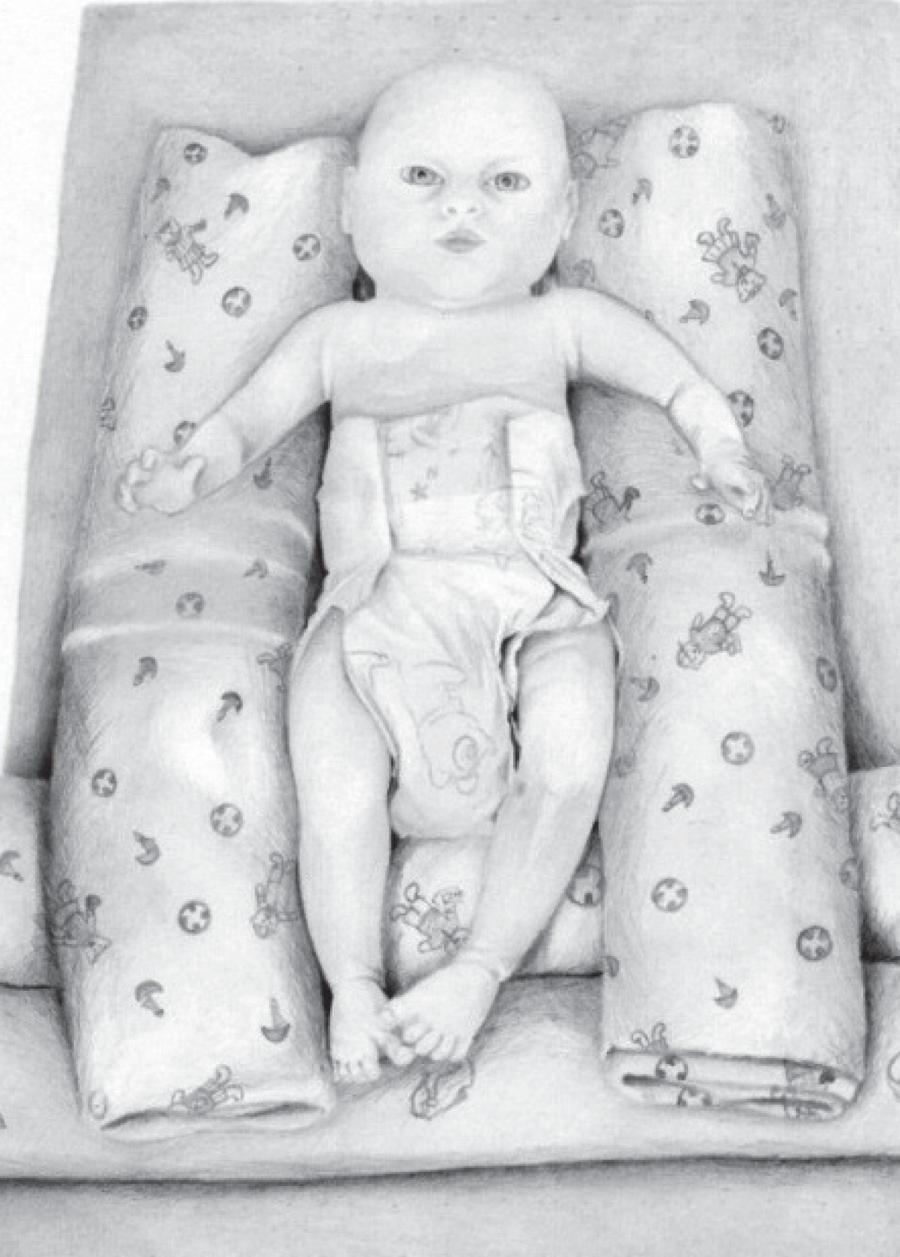
-
01-01-2015
Patient safety culture in a bone marrow transplantation unit
Revista Brasileira de Enfermagem. 2015;68(6):1139-1146
Abstract
Patient safety culture in a bone marrow transplantation unit
Revista Brasileira de Enfermagem. 2015;68(6):1139-1146
DOI 10.1590/0034-7167.2015680620i
Views0See moreABSTRACT
Objective:
evaluate the patient safety culture in the perspective of health professionals from a bone marrow transplantation unit of an oncology research center, at a reference hospital for cancer treatment in Santa Catarina, Brazil.
Method:
a quantitative cross-sectional study that used the Safety Attitudes Questionnaire was conducted between August and September 2013. The study analyzed 33 professional surveys. Statistical data analysis used descriptive and inferential statistics.
Results:
among the dimensions analyzed, only “job satisfaction” reached a mean score above 75, considered positive in terms of patient safety culture.
Conclusion:
the dimensions of safety culture present in the survey have to be valued by professionals and managers to allow safe patient care.
-
01-01-2015
Job satisfaction of nursing staff in a university hospital
Revista Brasileira de Enfermagem. 2015;68(6):1130-1138
Abstract
Job satisfaction of nursing staff in a university hospital
Revista Brasileira de Enfermagem. 2015;68(6):1130-1138
DOI 10.1590/0034-7167.2015680619i
Views0See moreABSTRACT
Objective:
identify the determinants of job satisfaction of the nursing staff of a public university hospital.
Method:
secondary study with mixed data approach and simple and multiple linear regression. A total of 115 subjects participated in the study, 41 nurses and 74 nursing assistants and technicians. The data collection occurred in 2013 using the QST-Caism questionnaire.
Results:
education, hierarchical level and workplace constitute job satisfaction determinants. However, age, gender, job and work period did not show this relationship. More educated workers held low job satisfaction if exercised not graduated nursing functions.
Conclusion:
graduated workers who perform high school functions are more unsatisfied than those who have high school function and qualification.
-
01-01-2015
Medical waste in mobile prehospital care
Revista Brasileira de Enfermagem. 2015;68(6):1122-1129
Abstract
Medical waste in mobile prehospital care
Revista Brasileira de Enfermagem. 2015;68(6):1122-1129
DOI 10.1590/0034-7167.2015680618i
Views0See moreABSTRACT
Objective:
the objective of this study is to identify how Medical Waste (MW) is managed in Mobile Prehospital Care (MPC) services in the state of São Paulo as well as characterize and quantify this waste.
Method:
exploratory and descriptive field study with data collection based on the methodology proposed by the Pan American Health Organization (PAHO), which was conducted over eight consecutive days to identify the production and characteristics of generated waste.
Results:
it was found that the MW management of the MPC is not yet in line with the requirements of RDC 306/04, which could affect the occupational safety of workers, patients, the community, and the environment.
Conclusion:
it is recommended for the health managers to focus on this issue. The lack of studies with regard to MPC also indicates the need for further studies on the waste management.

-
01-01-2015
Severe lactational mastitis: particularities from admission
Revista Brasileira de Enfermagem. 2015;68(6):1116-1121
Abstract
Severe lactational mastitis: particularities from admission
Revista Brasileira de Enfermagem. 2015;68(6):1116-1121
DOI 10.1590/0034-7167.2015680617i
Views0See moreABSTRACT
Objective:
to identify characteristics of women who have suffered severe lactational mastitis.
Method:
a descriptive, retrospective, documentary, quantitative study was performed. Data were collected from patient records of 114 hospitalized women from January of 2009 to December of 2013. Data were analyzed by using descriptive statistics.
Results:
a higher percentage of severe lactational mastitis was found in young, primiparous women who had completed high school, who had no partner, and did not have a job; 96.5% of women had breast complications before admission and remained hospitalized an average of 4.4 days; at discharge, 23.7% of women had weaned their infants.
Conclusion:
this study showed that severe lactational mastitis can cause great harm to the woman and the baby.
-
08-19-2024
Abuso sexual, aborto e saúde pública no brasil: quando o julgamento moral acentua as iniquidades
Revista Brasileira de Enfermagem. 2024;77:e77suppl0401
Abstract
Abuso sexual, aborto e saúde pública no brasil: quando o julgamento moral acentua as iniquidades
Revista Brasileira de Enfermagem. 2024;77:e77suppl0401
DOI 10.1590/0034-7167.202477suppl0401pt
Views0Eis aqui um editorial acadêmico-político que tem como objetivo convocar o campo científico a refletir sobre os perigos das decisões relativas ao direito ao aborto sob réguas morais, uma vez que não há evidências de que tal perspectiva se traduza em práticas de cuidado, proteção à infância e equidade de gênero – elementos tão urgentes […]See more -
ORIGINAL ARTICLE08-19-2024
The use of individual tracking programs in public health: a bioethics dilemma
Revista Brasileira de Enfermagem. 2024;77:e20230041
Abstract
ORIGINAL ARTICLEThe use of individual tracking programs in public health: a bioethics dilemma
Revista Brasileira de Enfermagem. 2024;77:e20230041
DOI 10.1590/0034-7167-2023-0041
Views0See moreABSTRACT
Objective:
to understand the bioethical perspectives on mobile tracking device use.
Methods:
theoretical study based on action research, carried out with eight graduate students from a public university. A focus group was used, with a thematic content analysis methodology with a codebook structure, approved by the Research Ethics Committee.
Results:
from the analysis, there was a concern about using devices after the pandemic ended. Using or not the device, rights inherent to humans, legislation and effectiveness of methods deepen interpretations, moving participants from a personalistic conception of the topic to a vision focused on professional implications about the methods.
Final considerations:
the debate on the impact of using technological devices on health, especially those that imply restriction of rights that refer to individuals’ private life, involves a discussion of a professional nature, in addition to requirement for clear rules on the topic.
-
ORIGINAL ARTICLE08-19-2024
Bioethical issues in the family health strategy: Considerations for nursing care management
Revista Brasileira de Enfermagem. 2024;77:e20220818
Abstract
ORIGINAL ARTICLEBioethical issues in the family health strategy: Considerations for nursing care management
Revista Brasileira de Enfermagem. 2024;77:e20220818
DOI 10.1590/0034-7167-2022-0818
Views0See moreABSTRACT
Objective:
To understand the bioethical issues involved in the care management of nurses working in the Family Health Strategy.
Method:
A qualitative study was conducted through five focus groups with 36 nurses selected in the sample. Thematic content analysis was performed based on the bioethical framework, and the synthesis was presented in a conceptual map.
Results:
Bioethical issues were identified in the nursing care practice, related to both specific bioethical themes and the peculiarities of the work. Additionally, challenges and facilitators that interfere with addressing these issues were identified.
Final considerations:
Understanding the bioethical issues involved in the care management of nurses was possible with the theoretical support of different bioethical perspectives. The identified issues relate to persistent and current themes in the field of bioethics. However, some aspects intrinsic to daily practice are still imperceptible to professionals, contributing to the difficulty of discussing bioethics in this care model.

-
REVIEW07-29-2024
Telenursing in the postoperative period: a scoping review
Revista Brasileira de Enfermagem. 2024;77(3):e20240066
Abstract
REVIEWTelenursing in the postoperative period: a scoping review
Revista Brasileira de Enfermagem. 2024;77(3):e20240066
DOI 10.1590/0034-7167-2024-0066
Views0See moreABSTRACT
Objectives:
to map available evidence on telenursing use in the postoperative period and its impact on patient outcomes.
Methods:
a scoping review, conducted according to the JBI model and the PRISMA-ScR checklist. The search was carried out in the CINAHL, Embase, LILACS, PubMed, Web of Science, SciELO, Scopus and Cochrane Library databases.
Results:
twelve studies were included, published between 2011 and 2023, 66.6% of which were in developed countries. Of the positive outcomes, we highlight improved levels of disability, autonomy and quality of life, lower rates of post-operative complications, pain and reduced costs. Telephone monitoring was the most widely used modality, but there were few studies in the pediatric context and in Brazil.
Conclusions:
of the studies, 11 (91.6%) identified at least one positive outcome in telenursing use and none showed negative aspects in the postoperative period. The role of nurses in digital health needs further study.

-
ORIGINAL ARTICLE07-29-2024
Men’s perception of paternal parenthood and the promotion of child development
Revista Brasileira de Enfermagem. 2024;77(3):e20230514
Abstract
ORIGINAL ARTICLEMen’s perception of paternal parenthood and the promotion of child development
Revista Brasileira de Enfermagem. 2024;77(3):e20230514
DOI 10.1590/0034-7167-2023-0514
Views0See moreABSTRACT
Objectives:
to comprehend men’s perception of paternal parenthood while caring for infants to promote child development.
Methods:
this qualitative study adopts an exploratory approach and was conducted with undergraduate and graduate students, faculty, and staff who are fathers of infants up to 6 months old from a higher education institution, excluding fathers from mononuclear families. Data collection occurred through semi-structured interviews and was analyzed using thematic categorical analysis.
Results:
fifteen men participated in the study. From the analysis, two empirical categories emerged: “Perception of being a father: challenges and novelties” and “Promotion of child development: actions carried out by fathers”. Fathers revealed feeling unprepared, the need for emotional support, and recognized activities aimed at their children’s development.
Final Considerations:
the relevance of the paternal figure for child development is highlighted, as well as the need for public policies to encourage paternal parenthood.
-
ORIGINAL ARTICLE07-29-2024
Contribution of informal caregivers to self-care in individuals with heart failure
Revista Brasileira de Enfermagem. 2024;77(3):e20230492
Abstract
ORIGINAL ARTICLEContribution of informal caregivers to self-care in individuals with heart failure
Revista Brasileira de Enfermagem. 2024;77(3):e20230492
DOI 10.1590/0034-7167-2023-0492
Views0See moreABSTRACT
Objectives:
to evaluate the contribution of informal caregivers to the self-care of individuals with heart failure.
Methods:
a cross-sectional study was conducted with 87 caregivers from March to October 2022 in the city of João Pessoa/PB. The caregivers’ contribution was assessed using the Caregiver Contribution to Self-Care of Heart Failure Index instrument. Scores ≥ 70 points indicate adequate contribution. Data were analyzed using descriptive statistics and Spearman’s correlation.
Results:
the sample consisted of 81.6% female caregivers. Median scores obtained for the self-care contribution scales were: 63.3 for maintenance; 55.5 for management; and 66.6 for confidence. Caregivers never or rarely recommended monitoring body weight, regular physical exercise, extra use of diuretics, and fluid restriction.
Conclusions:
informal caregivers showed inadequate contribution in the areas of maintenance, management, and confidence in self-care of individuals with heart failure.
-
07-29-2024
Reflections on theoretical framework use in nursing research
Revista Brasileira de Enfermagem. 2024;77(3):e20230486
Abstract
Reflections on theoretical framework use in nursing research
Revista Brasileira de Enfermagem. 2024;77(3):e20230486
DOI 10.1590/0034-7167-2024-0486
Views0See moreABSTRACT
Objectives:
to reflect on theoretical framework use in nursing research.
Methods:
a theoretical-reflexive study, based on concepts and constructs pertinent to using nursing theories and other sciences, considering issues of epistemology or philosophy of science.
Results:
we presented what it is and why to do nursing research and what a theoretical framework is and why to use it, in addition to some considerations regarding theoretical framework use in nursing research, essential for constructing disciplinary knowledge, which enables the materialization of researchers’ work and the presentation of propositions resulting from investigations in and for nursing as a discipline and science.
Final Considerations:
based on a reflection based on epistemological conceptions, it is possible to affirm that a theoretical framework is the core of researchers’ thinking, delimiting a problem to be investigated and, based on it, outlining methodological strategies to be followed, supporting nursing action and thinking as discipline and science.

-
REVIEW07-29-2024
Nursing diagnoses for people hospitalized with heart failure: an integrative review
Revista Brasileira de Enfermagem. 2024;77(3):e20230471
Abstract
REVIEWNursing diagnoses for people hospitalized with heart failure: an integrative review
Revista Brasileira de Enfermagem. 2024;77(3):e20230471
DOI 10.1590/0034-7167-2023-0471
Views0See moreABSTRACT
Objectives:
to identify in the literature the main nursing diagnoses according to the NANDA-I diagnostic classification for people hospitalized with heart failure.
Methods:
an integrative literature review, carried out in February 2019 and updated in July 2023, in the MEDLINE via PubMed, LILACS, SciELO and CINAHL databases. Given the use of acronym PEO, studies without a time cut in Portuguese, English and Spanish were included. Descriptive analysis was carried out to present the identified information.
Results:
analysis of 27 articles identified 24 nursing diagnoses, with emphasis on Decreased Cardiac Output, Excessive Fluid Volume, Decreased Activity Tolerance and Fatigue.
Final Considerations:
evidence can contribute to better diagnostic decisions centered on people with heart failure in search of more assertive health results and have the potential to support future studies on a possible syndromic pattern in this population.

-
RESEARCH01-01-2017
Nursing throughout war times: political propaganda and professional valorization (1942-1945)
Revista Brasileira de Enfermagem. 2017;70(2):407-414
Abstract
RESEARCHNursing throughout war times: political propaganda and professional valorization (1942-1945)
Revista Brasileira de Enfermagem. 2017;70(2):407-414
DOI 10.1590/0034-7167-2016-0440
Views0See moreABSTRACT
Objective:
to discuss the symbolic effects of the publication on written press of institutional rites related to the courses promoted by the Brazilian Federal District’s Schools of Nursing during the Second World War.
Method:
exploratory and documentary study, whose sources were treated by historical method.
Results:
one noticed, in the news reports analyzed, that the Brazilian Estado Novo has used nurses images to divulge within the society the woman’s acting altruistic model in service to the country, through the systematic diffusion by the press of her honorable acting during the war, what assured the amplification of the visibility and acknowledgment of the Nursing profession in that context.
Conclusion:
the diffusion by press of emergency nurses graduations magnified their apparition in public spaces, occasion on which the institutional rite was strategically used to transmit to the society the urgency of the new profession, in order to support the political causes in vigor in the country.
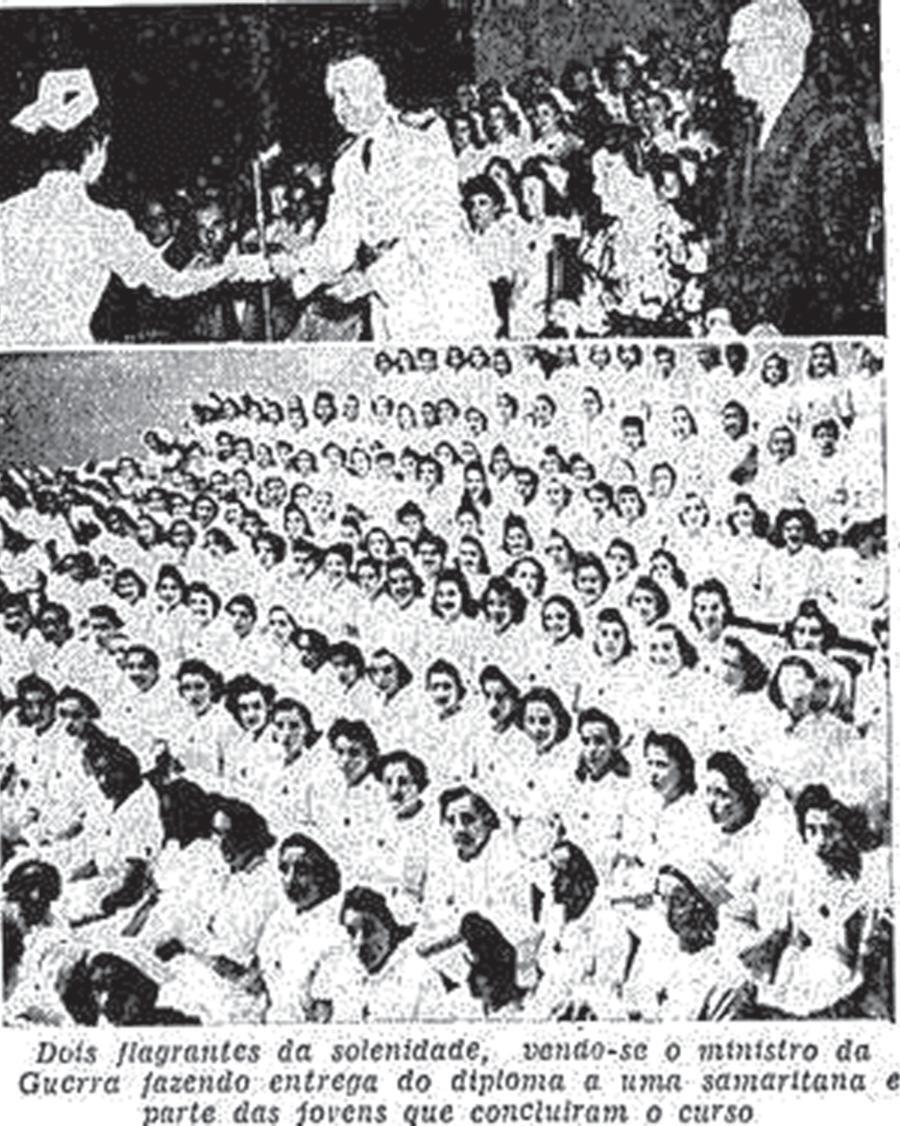
-
RESEARCH01-01-2017
Conformity of nurse prescribing to care needs: nurses’ understanding
Revista Brasileira de Enfermagem. 2017;70(2):400-406
Abstract
RESEARCHConformity of nurse prescribing to care needs: nurses’ understanding
Revista Brasileira de Enfermagem. 2017;70(2):400-406
DOI 10.1590/0034-7167-2016-0107
Views0See moreABSTRACT
Objective:
investigate the understanding of nurses on nurse prescribing conformity to the care needs of hospitalized patients and factors associated with that conformity.
Method:
a descriptive study, with a quantitative approach, was conducted at 20 in-patient units of a teaching hospital in the state of São Paulo. The participants (N=139) answered a semi-structured questionnaire.
Results:
For 43 (30.9%) nurses, nurse prescribing is always in line with patients’ care needs. The fields of body care and elimination, skin and mucosa care and investigation and monitoring were the most frequently addressed.
Conclusion:
in the perception of most nurses, nurse prescribing does not conform with patients’ health heeds. The establishment of strategies to improve prescribing quality is recommended, as well as the development of permanent qualification programs and the systematic use of instruments for assessment of patients’ care demands regarding nursing.
-
RESEARCH01-01-2017
Religious and spiritual coping in people living with HIV/Aids
Revista Brasileira de Enfermagem. 2017;70(2):392-399
Abstract
RESEARCHReligious and spiritual coping in people living with HIV/Aids
Revista Brasileira de Enfermagem. 2017;70(2):392-399
DOI 10.1590/0034-7167-2015-0170
Views0See moreABSTRACT
Objective:
evaluate the religiosity and the religious/spiritual coping of people living with HIV/Aids.
Method:
descriptive, cross-sectional study with quantitative approach, conducted in a reference HIV/Aids outpatient clinic in a university hospital of Recife-PE, Brazil, from June to November 2015. At total of 52 people living with HIV/Aids (PLWHA) participated in the research, which employed own questionnaire, the Duke University Religion Index (DUREL), and the Religious/Spiritual Coping Scale (RCOPE).
Results:
the sample presented high indices of organizational religiosity (4.23±1.66), non-organizational religiosity (4.63±1.50), and intrinsic religiosity (13.13±2.84). Positive RCOPE was used in high mean scores (3.66±0.88), and negative RCOPE had low use (2.12 ± 0.74). In total, use of RCOPE was high (3.77±0.74), having predominated the positive RCOPE (NegRCOPE/PosRCOPE ratio=0.65±0.46).
Conclusion:
it is evident the importance of encouraging religious activity and RCOPE strategies, seen in the past as inappropriate interventions in clinical practice.
-
RESEARCH01-01-2017
Satisfaction and dissatisfaction in the work of recyclable solid waste segregators: convergent-care research
Revista Brasileira de Enfermagem. 2017;70(2):384-391
Abstract
RESEARCHSatisfaction and dissatisfaction in the work of recyclable solid waste segregators: convergent-care research
Revista Brasileira de Enfermagem. 2017;70(2):384-391
DOI 10.1590/0034-7167-2016-0325
Views0See moreABSTRACT
Objectives:
describe elements that promote satisfaction and dissatisfaction in the work of recyclable solid waste segregators and conduct a nursing action focused on these elements.
Method:
qualitative research, convergent-care, conducted with members of the cooperative. Data production occurred during 2015 through participation observation, semi-structured interviews, and a convergence group. Analysis comprised the phases Apprehension, Synthesis, Theorization, and Transference.
Results:
four categories emerged. They showed satisfaction and dissatisfaction related to identification with tasks and work content, material and personal gains obtained from solid waste segregation, prejudice, lack of appreciation, and difficulties in interpersonal relationships. This last item, due to its importance, received a nursing action.
Conclusion:
the study contributed to the advancement of knowledge and the association of possibilities between the research performance and nursing care for workers.
-
RESEARCH01-01-2017
The game as strategy for approach to sexuality with adolescents: theoretical-methodological reflections
Revista Brasileira de Enfermagem. 2017;70(2):376-383
Abstract
RESEARCHThe game as strategy for approach to sexuality with adolescents: theoretical-methodological reflections
Revista Brasileira de Enfermagem. 2017;70(2):376-383
DOI 10.1590/0034-7167-2016-0043
Views0See moreABSTRACT
Objective:
To describe the Papo Reto [Straight Talk] game and reflect on its theoretical-methodological basis.
Method:
Analytical study on the process of elaboration of the Papo Reto online game, destined to adolescents aged 15-18 years, with access to the Game between 2014 and 2015.
Results:
the interactions of 60 adolescents from Belo Horizonte and São Paulo constituted examples of the potentialities of the Game to favor the approach to sexuality with adolescents through simulation of reality, invention and interaction. Based on those potentialities, four thinking categories were discussed: the game as pedagogic device; the game as simulation of realities; the game as device for inventive learning; and the game empowering the interaction.
Conclusion:
By permitting that the adolescents take risks on new ways, the Game allows them to become creative and active in the production of senses, in the creation of their discourses and in the ways of thinking, feeling and acting in the sexuality field.
-
RESEARCH01-01-2017
Tuberculosis among prison staff in Rio Grande do Sul
Revista Brasileira de Enfermagem. 2017;70(2):370-375
Abstract
RESEARCHTuberculosis among prison staff in Rio Grande do Sul
Revista Brasileira de Enfermagem. 2017;70(2):370-375
DOI 10.1590/0034-7167-2016-0012
Views0See moreABSTRACT
Objective:
to evaluate the risk of infection and illness caused by Mycobacterium tuberculosis among health care and security staff in prisons in two regions of Rio Grande do Sul (RS).
Method:
cross-sectional study involving prison staff. An interview and sputum smear microscopy and culture were performed. Latent infection was evaluated according to the result of the tuberculin test (TT), self-referred.
Results:
among staff who had a TT, 10 (83.3%) in the central region and 2 (16.7%) in the southern region were considered reactors. Length of employment among prison officers who reacted to TT was 15.3 years, and among health care workers, 4.1 years (p = 0.01). No cases of active tuberculosis (TB) were identified.
Conclusion:
prevalence of latent TB was 27.9%. Length of employment between different professional categories and their working regions was considered a risk factor for latent TB.
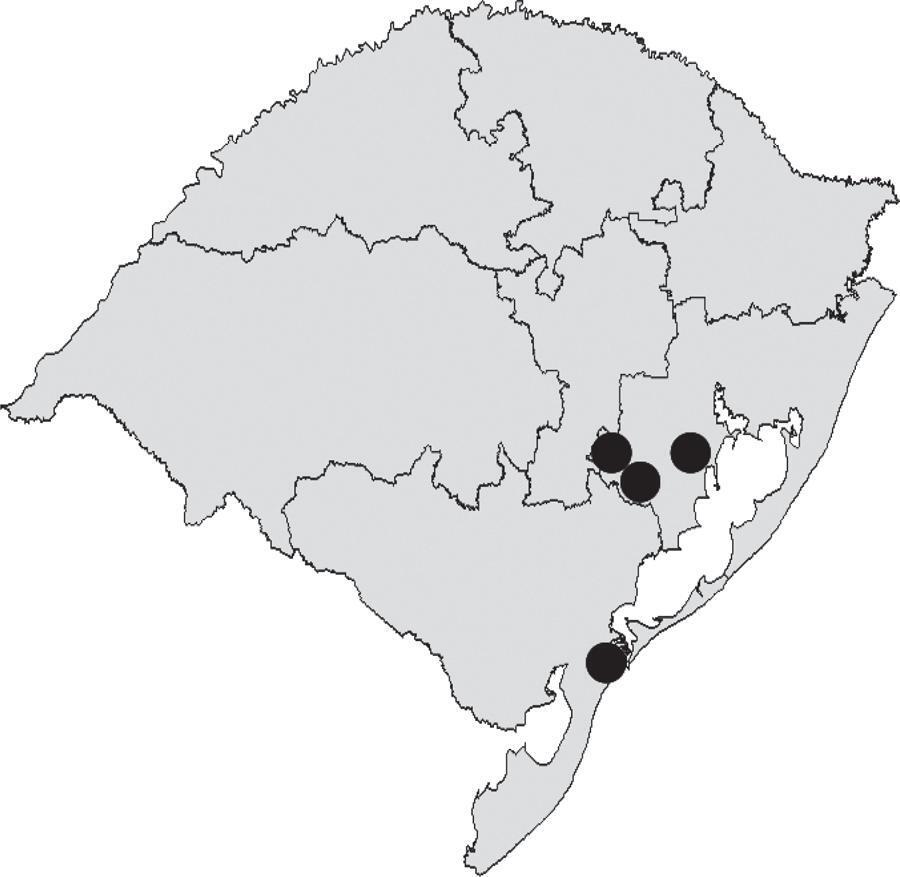
-
RESEARCH01-01-2017
Portable bathtub: technology for bed bath in bedridden patients
Revista Brasileira de Enfermagem. 2017;70(2):364-369
Abstract
RESEARCHPortable bathtub: technology for bed bath in bedridden patients
Revista Brasileira de Enfermagem. 2017;70(2):364-369
DOI 10.1590/0034-7167-2016-0178
Views0See moreABSTRACT
Objective:
determine the benefits of the Portable Bathtub as technology for bed bath in bedridden patients.
Method:
qualitative research of exploratory-descriptive character, whose data were collected by means of 30 interviews with patients, family members and professionals directly involved in bed bath, carried out with Portable Bathtub, in bedridden patients of a medical clinic, from July to December 2015.
Results:
from the data encoded by thematic content analysis resulted two categories: Portable Bathtub: from morphine to the patient’s rekindled eyes; From mechanized practice to unique, transforming care.
Conclusion:
we concluded that the Portable Bathtub constitutes enhancing technology, as it enables clinical improvement of the patient’s general condition and transcends traditional mechanized practices by the reach of advanced nursing care practices.
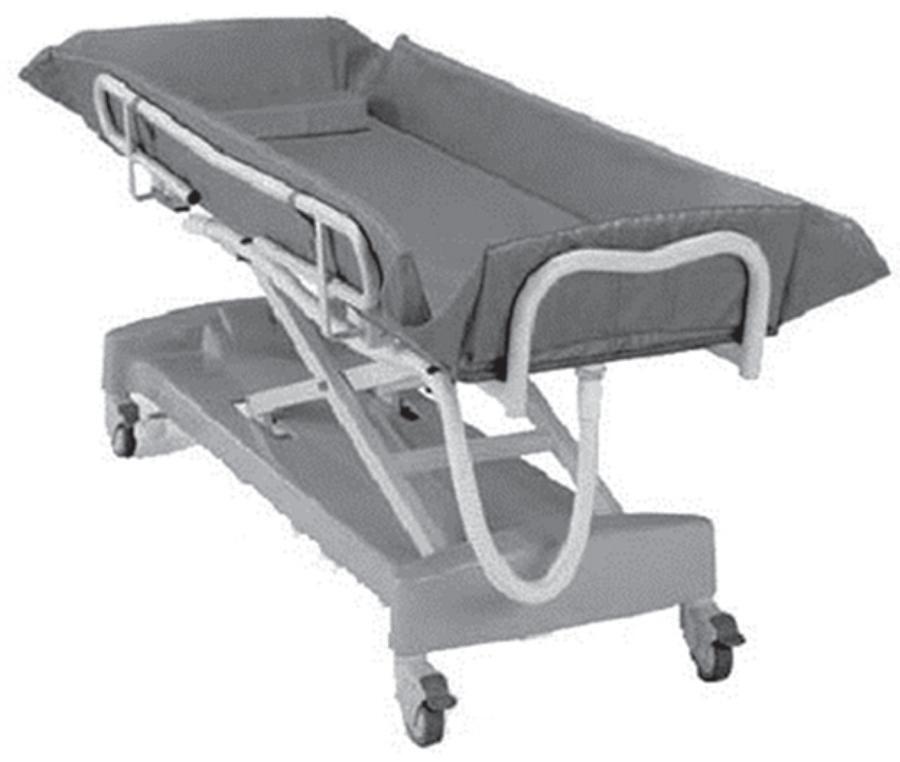
-
RESEARCH01-01-2017
Direct cost of monitoring conventional hemodialysis conducted by nursing professionals
Revista Brasileira de Enfermagem. 2017;70(2):357-363
Abstract
RESEARCHDirect cost of monitoring conventional hemodialysis conducted by nursing professionals
Revista Brasileira de Enfermagem. 2017;70(2):357-363
DOI 10.1590/0034-7167-2016-0447
Views0See moreABSTRACT
Objective:
to analyze the mean direct cost of conventional hemodialysis monitored by nursing professionals in three public teaching and research hospitals in the state of São Paulo, Brazil.
Method:
this was a quantitative, explorative and descriptive investigation, based on a multiple case study approach. The mean direct cost was calculated by multiplying (clocked) time spent per procedure by the unit cost of direct labor. Values were calculated in Brazilian real (BRL).
Results:
Hospital C presented the highest mean direct cost (BRL 184.52), 5.23 times greater than the value for Hospital A (BRL 35.29) and 3.91 times greater than Hospital B (BRL 47.22).
Conclusion:
the costing method used in this study can be reproduced at other dialysis centers to inform strategies aimed at efficient allocation of necessary human resources to successfully monitor conventional hemodialysis.
Search
Search in:
Nuvem de Tags
Adolescente (85) Atenção Primária à Saúde (239) COVID-19 (91) Criança (91) Cuidados de Enfermagem (269) Educação em Enfermagem (151) Educação em Saúde (139) Enfermagem (930) Enfermagem Pediátrica (86) Estudantes de Enfermagem (77) Estudos de Validação (131) Família (87) Idoso (208) Promoção da Saúde (99) Qualidade de Vida (104) Saúde do Trabalhador (86) Saúde Mental (145) Saúde Pública (82) Segurança do Paciente (150) Tecnologia Educacional (100)



